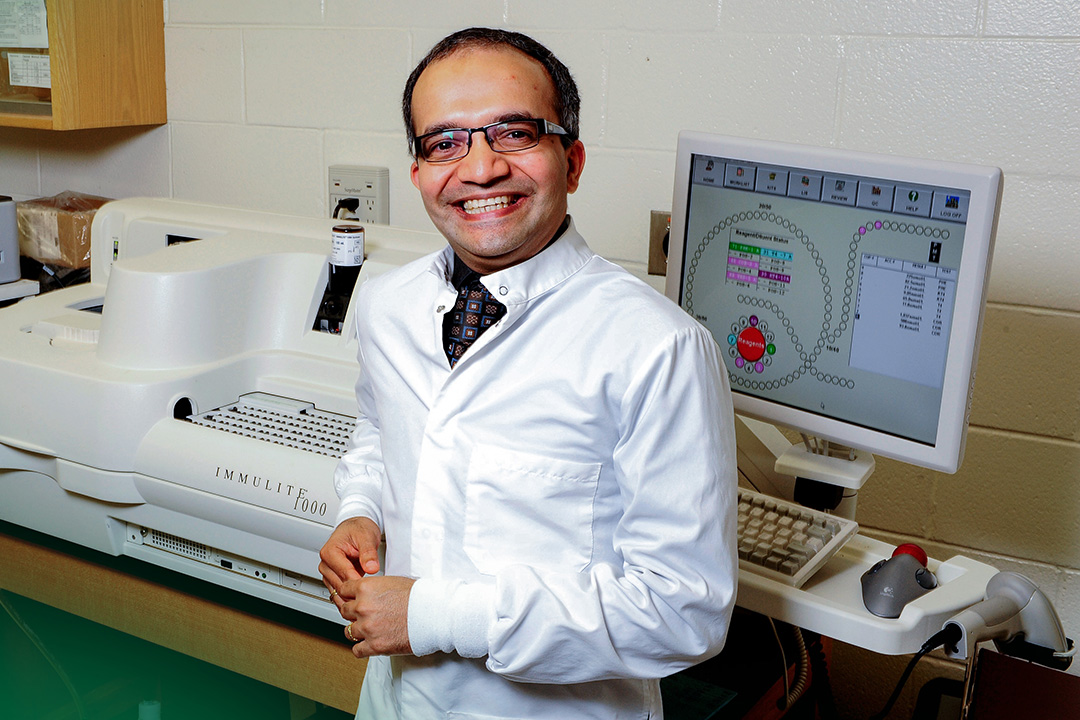
WCVM team researching hormones for better health
A high school biology class sparked a lifelong passion for University of Saskatchewan (USask) scientist Dr. Suraj Unniappan (PhD).
By Katie Brickman-Young“Those basic concepts that my Grade 10 teacher taught are still the basic concepts we use every day. That’s what is most fascinating for me — to apply those concepts in our research today,” says Unniappan, whose research and teaching focuses on the endocrine system.
This collection of hormone-producing glands regulates metabolism, growth and development, reproduction, sleep and mood in mammals.
“The endocrine system releases chemicals that regulate many processes in the organism,” explains Unniappan. “In the hierarchy of systems in all animals, hormones regulate and integrate all functions.”
As the university’s Centennial Enhancement Chair in Comparative Endocrinology, Unniappan and his research team are helping to make those connections between animal health and public health.
With billions of dollars spent on treating diseases worldwide, Unniappan’s research team aims to use their research findings as the basis for new diagnostic tools or treatment plans for illnesses such as diabetes and obesity.
In the past eight years, his team has received over $2.5 million in funding from several agencies, including the Natural Sciences and Engineering Research Council of Canada (NSERC), Canadian Institutes of Health Research (CIHR), and the Saskatchewan Health Research Foundation (SHRF) to work toward that goal.
“Our research is showing that the mechanism in disease is similar in humans and animals. The value in that is when you understand the mechanisms are the same in animals, we can develop a treatment or diagnostic tool for a particular disease,” says Unniappan.
“The foundational principle of how comparative endocrinology could help a One Health team is because of the nature of hormones and the role in regulating physiological processes.”
Unniappan’s Laboratory of Integrative Neuroendocrinology is based in the Western College of Veterinary Medicine (WCVM), where he’s a professor in the Department of Veterinary Biomedical Sciences.
“I named my lab this way because it integrates everything,” he says. “Neurology and endocrinology work hand in hand. In the hierarchy of systems in animals, hormones regulate and integrate all functions. We are interested in how hormones integrate with feeding, metabolism, growth and reproduction.”
Originally from India, Unniappan came to Canada in 1999 and attended the University of Alberta, where he studied hormones and how they regulate feeding and metabolism in fish. He completed his PhD degree in 2004 before taking postdoctoral training at the University of British Columbia.
In 2006, he became a faculty member at York University in Toronto and set up his comparative endocrinology research program using both fish and rodent models to compare the structure and function of hormones.
In 2012, he joined the WCVM as an endocrinology researcher and the faculty member in charge of the endocrine research lab, with the aim of enhancing the college’s research program. Since then, Unniappan’s research team has accomplished a great deal — especially in research focusing on new peptides (short chains of amino acids) such as nesfatin-1 and phoenixin-20.
“The research we are doing at the college is unmatched because we have all the facilities, and we have talented collaborators who are supportive,” says Unniappan.
“We hope to translate some of these results in diagnosis and treatments over the next four years. That is an ambitious plan, but also pushes us to the next level. Our research is all over the map, but that is the goal. You can’t compartmentalize endocrinology.”
Another sign of success is publishing. In 2020, Unniappan and his team have had 11 research articles published in international, peer-reviewed journals — including several papers in the prestigious Scientific Reports and the Journal of Cell Physiology, a high-impact journal in the field. As well, Unniappan is the author of an e-book that will be available later this year.
